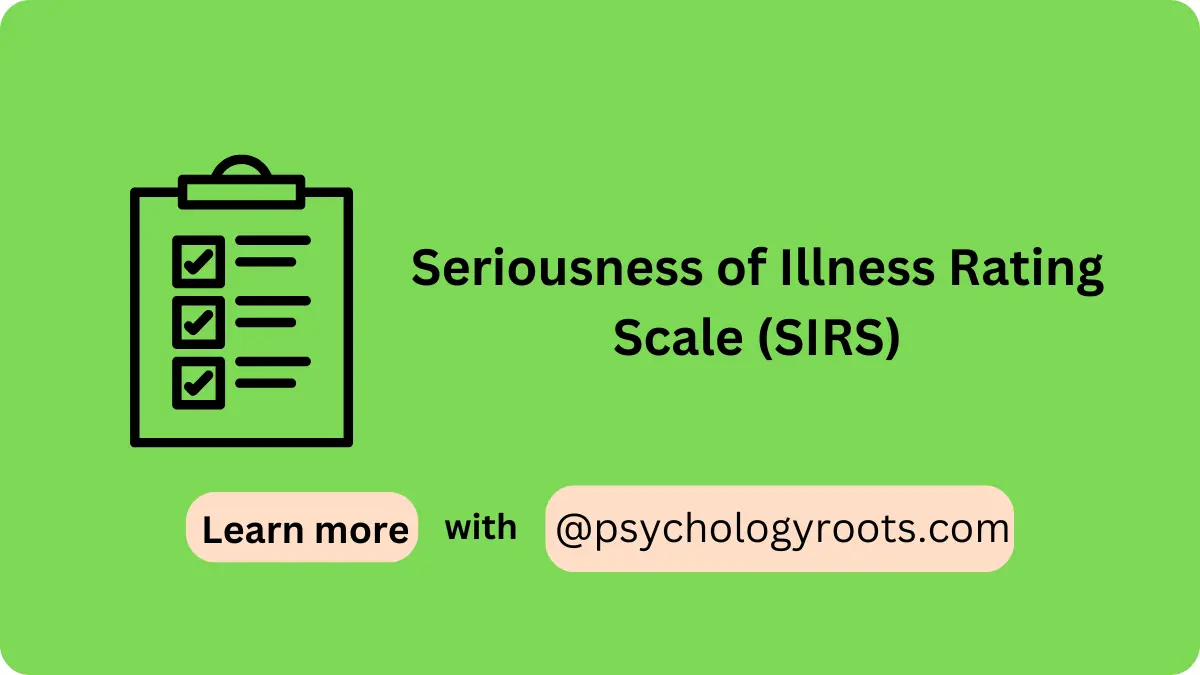Table of Contents
Seriousness of Illness Rating Scale (SIRS)
Here in this post, we are sharing the “Seriousness of Illness Rating Scale (SIRS)”. You can read psychometric and Author information. We have thousands of Scales and questionnaires in our collection (See Scales and Questionnaires). You can demand us any scale and questionnaires related to psychology through our community, and we will provide you with a short time. Keep visiting Psychology Roots.
About Seriousness of Illness Rating Scale (SIRS)
Scale Name
Seriousness of Illness Rating Scale (SIRS)
Author Details
Wyler, A. R., Masuda, M., and Holmes, T. H.
Translation Availability
English

Background/Description
The Seriousness of Illness Rating Scale (SIRS) is a 126-item self-report checklist developed to measure the impact of physical and mental illnesses based on their perceived severity. Introduced by Wyler, Masuda, and Holmes in 1968, the scale evaluates a range of illnesses and symptoms, assigning severity weights derived from physician and layperson ratings. These weights are used to compute a cumulative illness score, offering insights into an individual’s health burden over a six-month period.
Sample items include everyday conditions like the common cold, with a severity weight of 62, and more severe conditions such as hepatitis (weight 488) and heart attack (weight 855). This tool has been widely applied in stress and illness research, particularly for exploring the relationship between psychological stress and physical health outcomes. Its comprehensive nature and established psychometric properties make it a valuable resource in clinical and research settings.
Administration, Scoring and Interpretation
- Obtain the Copy: Available through research publications, such as the Journal of Psychosomatic Research.
- Purpose: To evaluate the cumulative severity of self-reported illnesses and symptoms over the past six months.
- Instructions: Respondents check off illnesses or symptoms they have experienced in the past six months. Scores are calculated by summing the severity weights of the selected items.
- Time: Approximately 15–20 minutes.
- Administer the Scale: Can be self-administered or conducted in a clinical or research setting under guidance.
Reliability and Validity
The SIRS demonstrates strong reliability and validity, consistently performing well across studies in stress-illness research. It has been particularly useful in hardiness research, providing robust measures of illness severity. The scale’s comprehensive design allows for detailed assessments of illness impact, enhancing its utility for both clinical applications and psychological studies.
Available Versions
126-Items
Reference
Wyler, A. R., Masuda, M., & Holmes, T. H. (1968). Seriousness of illness rating scale. Journal of Psychosomatic Research.
Important Link
Scale File:
Frequently Asked Questions
What is the primary purpose of the SIRS?
To assess the severity and cumulative impact of self-reported illnesses and symptoms over a six-month period.
Can it measure both physical and mental illnesses?
Yes, the SIRS includes items related to both physical and mental health conditions.
Who typically uses this scale?
It is commonly used in stress-illness research and studies examining the relationship between psychological stress and physical health.
How are the scores interpreted?
Scores are calculated by summing the severity weights of all reported illnesses, offering an overall measure of illness burden.
Is the SIRS suitable for clinical use?
Yes, it is widely used in both clinical and research contexts to explore health outcomes and stress-related illnesses.
Disclaimer
Please note that Psychology Roots does not have the right to grant permission for the use of any psychological scales or assessments listed on its website. To use any scale or assessment, you must obtain permission directly from the author or translator of the tool. Psychology Roots provides information about various tools and their administration procedures, but it is your responsibility to obtain proper permissions before using any scale or assessment. If you need further information about an author’s contact details, please submit a query to the Psychology Roots team.
Help Us Improve This Article
Have you discovered an inaccuracy? We put out great effort to give accurate and scientifically trustworthy information to our readers. Please notify us if you discover any typographical or grammatical errors.
Make a comment. We acknowledge and appreciate your efforts.
Share With Us
If you have any scale or any material related to psychology kindly share it with us at psychologyroots@gmail.com. We help others on behalf of you.